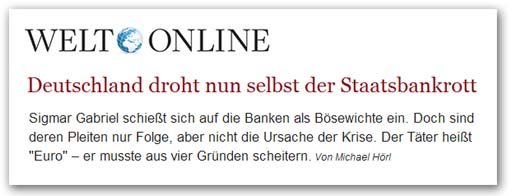26/07/2012
Following the eurocrisis is one of the most difficult things I've done. But it is not only the complexity of the twists and turns, and the international dimensions, leavened by the opacity of EU politics. There is also the tedium and weariness of a war of attrition, and the number of false starts and unfulfilled predictions of doom.
But I have to says I've never seen headlines quite like this one in
Die Welt (headline above), declaring that even Germany is now threatened with bankruptcy by the euro. The piece is by Austrian writer and economist Michael Hörl, and he takes on the single currency issue full frontal, identifying four reasons why the euro had to fail.
Reason one is the cultural differences between the eurozone members; two is the artificially low interest rate which reduced the cost of debt; three is the "one size fits all" interest rate and the fourth is that the euro has increased the wages of poor countries for a short time â without a corresponding increase in productivity.
Hörl says Greece must be made bankrupt â for the sixth time in 150 years. And while this sort of argument is not new to us in Britain, it is less common in Germany. Such candid writing, therefore, indicates that the wind has changed. The Germans are being exposed to reality.
Bizarrely, though,
The Economist is taking an optimistic line, with an article on how the euro was saved. It cites Ewald Nowotny, head of Austria's central bank and an ECB council member, speaking in favour of the ESM being given a banking license and making it a bank and lender of last resort â suggesting that this could be the turning point, as ECB and German resistance weakens.
But these things are not going to happen â not any time soon.
The Economist is living in a fantasy world. The German media has seen the light - and the euro is domed.

